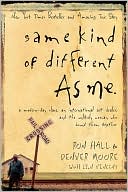Exchange Is Not Robbery: More Stories of an African Bar Girl
While living in West Africa in the 1970s, John Chernoff recorded the stories of "Hawa," a spirited and brilliant but uneducated woman whose insistence on being respected and treated fairly propelled her, ironically, into a life of marginality and luck as an "ashawo," or bar girl. Rejecting traditional marriage options and cut off from family support, she is like many women in Africa who come to depend on the help they receive from one another, from boyfriends, and from the men they meet in...
Search in google:
While living in West Africa in the 1970s, John Chernoff recorded the stories of "Hawa," a spirited and brilliant but uneducated woman whose insistence on being respected and treated fairly propelled her, ironically, into a life of marginality and luck as an ashawo, or bar girl. Rejecting traditional marriage options and cut off from family support, she is like many women in Africa who come to depend on the help they receive from one another, from boyfriends, and from the men they meet in bars and nightclubs. Refusing to see herself as a victim, Hawa embraces the freedom her lifestyle permits and seeks the broadest experience available to her. In Exchange Is Not Robbery and its predecessor, Hustling Is Not Stealing, a chronicle of exploitation is transformed by verbal art into an ebullient comedy. In Hustling Is Not Stealing, Hawa is a playful warrior struggling against circumstances in Ghana and Togo. In Exchange Is Not Robbery, Hawa returns to her native Burkina Faso, where she achieves greater control over her life but faces new difficulties. As a woman making sacrifices to live independently, Hawa sees her own situation become more complex as she confronts an atmosphere in Burkina Faso that is in some ways more challenging than the one she left behind, and the moral ambiguities of her life begin to intensify. Combining elements of folklore and memoir, Hawa's stories portray the diverse social landscape of West Africa. Individually the anecdotes can be funny, shocking, or poignant; assembled together they offer a sweeping critical and satirical vision. Publishers Weekly Fans of Hustling Is Not Stealing will be eager for these further adventures of Hawa, the West African bar girl who told her stories to musicologist Chernoff in 1977 and 1979. Though it's better to start with the first volume, this sequel could stand alone if necessary. The earlier tales were set in Ghana and Togo. Now Hawa has migrated back to her father's country, Burkina Faso, where she's working in the nightclubs of Ouagadougou, while periodically visiting her ailing father's village. She details the complex economic arrangements of bar life-the commission system for hustling drinks, the various rates for sex with bar clients and the informal banking system for safeguarding a girl's daily take. Indeed, Hawa focuses almost exclusively on bottom-line financials-how to get money out of different sorts of men, the relative benefits of living as a mistress, wife or girlfriend, and the competition from cheap prostitutes. She even discusses the downside of her hustling life: with no husband, she's devalued in village life and has no income security. Still, Hawa prefers this to what she sees as the false security of marriage. Hawa sounds much older now, with little of the exuberance that made Hustling so compelling. Still, for Africanists, feminists and those who know the hard-won value of street knowledge, Hawa remains a strong, provocative teacher. Maps, glossary. (Dec.) Copyright 2004 Reed Business Information.
Exchange Is Not Robbery \ MORE STORIES OF AN AFRICAN BAR GIRL \ \ By John M. Chernoff \ THE UNIVERSITY OF CHICAGO PRESS \ Copyright © 2005 The University of Chicago\ All right reserved.\ ISBN: 978-0-226-10355-6 \ \ \ \ \ Chapter One \ A STRANGER AT HOME \ : Love That Makes One Sick : The Story of Woman : Getting an Identity Card : Virginity as a Fatal Disease\ : OUAGADOUGOU :\ Love That Makes One Sick\ The time I left Lomé, my friend Mama Amma and I traveled to Ouagadougou. You know, I have a brother there. He is not my father's son; he's the son of my mother's big sister. When we dropped at Ouagadougou, we asked a driver at the lorry park, and he showed us a Gurunsi woman, and when we asked her, she knew my brother. She paid the taxi fare to carry us to my brother's place. Then we slept there.\ And what got me annoyed: my brother was so gentle with his wife, and he was trying to play some fucking things with us. Mama Amma used to laugh at me on this case, but I always used to be annoyed. The way my brother was with his wife: evening time, they would bring the chairs outside. Then they would put their table in front of them. Then they would bring their television and put it on. And their children were also sitting behind there. Then she and the husband would start eating. Sometimes she would cut the food and put it in the husband's mouth. They were always doing things like this. And we were all sitting outside to eat, you know. So I used to be annoyed. I used to heat! What is he doing all this for? When we are eating, we are eating. If we finish, they are together: they can do whatever they want. But not the time when we will all come around to eat.\ And then there was another woman, the first wife of my brother. He divorced that woman. I used to feel pity for her. Then I used to be annoyed more. Ha! When he divorced her, the woman said she would never marry again in her life. She would stay in the same house and die there, because she had children, and her children were the first senior children for my brother, so she wouldn't leave the house and let the other bad woman come and treat these children in some way. So she was there. They would give her chop money like the other one. They would buy her dresses. They would do everything for her. They gave her a place to sleep. So as they were doing that with the food, you know, it was like they were teasing that woman. So I used to be annoyed! You know, I used to take it sometimes as if I was that woman. Ha! I used to tell Mama Amma: "No! Shit! Even this kind of soup, which they play romance with, how can we eat it?" Then I would say, "Let's go out and eat." Ha-ha!\ And at my brother's place, every time he wanted to be giving advice to people-to be quiet, like the way he is, and he doesn't know how to drink, only Coca-Cola or Fanta. He wanted to be-shit! I used to get fed up there. The first day when we arrived in Ouaga, you know, the day when we went to his place, they gave us a room, with air conditioning. It was a nice place. Ask Mama. It had a bathroom, everything. And they had another section to the side, like a quarters,1 for the children and the maid. But the way this man and his wife received me the first day, I wasn't happy. I told Mama, "Mama, as for me, I can't stay here."\ Mama said, "Why? Hey, you have nice brother like this."\ Then I said, "What kind of nice? Don't you know Africans? If you see that an African man smiles a big smile, it's not in his heart. If you look at his eyes, you will know. As for this man, he is just making all this on face. So I don't agree with him."\ Then she said, "Oh, but they are nice." And this and that.\ OK. The day we arrived, we were tired, so he let us sleep. We slept to the time when we wanted. The next morning when they took their tea, they put our own on a table, coffee and tea and bread and butter, and they took napkins and covered it. So when we woke up, the children said, "You people's coffee is here. Let us bring you hot water."\ But still I wasn't happy. Evening time, they had that nyama-nyama television. Ha! The way you will see the Mossi people inside, they sing like they cry: wo-ee, wo-ee, wo-ee. Ha! Then my brother and the wife wouldn't get tired and go inside the room. They would start doing something. So when I was seeing all this, I used to get annoyed.\ So one night, I finished my bath, and I was outside to dry. I was dry, but you know, at that time it was starting to get hot, so I was outside the house.\ Then my brother was asking me, "Wouldn't you feel to sleep yet?"\ Then I said, "No, I don't feel to sleep yet."\ Then he said, "Ah, as for us, we sleep early."\ And I said, "Oh, I want to take a small breeze outside."\ Then the wife said they were going to sleep, so if I'm going to lock the door, I should be sure that the door is locked. Then I said, "You can lock it."\ Then my brother said, "Why should you answer like that? Why should you give her an answer that she should lock the door?\ Then I said, "Yes, I'm not feeling to go inside. And I can't be sure the door is locked, because I haven't locked a door like this before. I haven't seen a door like this before in my life."\ Then my brother said I was giving her cheek, and I said, "I'm not giving her cheek. She is giving me cheek, because she thinks your room is better than everybody's room. And she thinks I haven't seen a house like this before. That's why she's telling me to look at the door. She is not right to tell me I should lock the door. I'm not a child. I should know the door, where to lock it."\ And my brother said, "Eh-h, you know, if you have a problem with my wife, you shouldn't make it with me."\ Then I said, "Why did you ask then? If she does something, I can ask her a question. But why should you answer? Why don't you let her answer?"\ Then my brother said, "No. If you want to get a problem with me, maybe if it's the way we used to sleep early, and you don't want to be sleeping at that time, just tell me. I will tell the people. When you come back, they will open the door."\ Then I said, "If I want to go out, you can't tell me not to. But I don't know. I think I have been giving you respect, but I didn't know that you are somebody like that."\ Then he said, "Hey, what are you saying?"\ I said, "Yes, I'm talking something. I didn't believe that you would tell me this. I just came. I just arrived. Maybe I'm tired or something like that. But the day when I'm feeling to go out, I'm not afraid of you. I can tell you that I'm going out. If you tell me, 'If you go out, don't come back,' then I'll pack my things and go. That's all."\ So he said, "Oh. Thank you very much. I'm going to sleep."\ Then I said, "Thanks, too. But if you sleep also, you have to lock the door."\ "So you won't stop?"\ I said, "No, you have to lock the door, because I'm not-I'm not feeling like sleeping inside self. I will go and sleep with the children over there."\ So he didn't lock the door. He just closed it. I also didn't go inside. I went and slept with our small brother in the quarters. Morning time, the wife was the first person to be talking about this case. They didn't say it in front of me. They just started making, "Mmhm, mm-hm, hm-hm." Like that. Yesterday the door was standing unlocked, mm-hm, hm-hm, and that and this, mm-hm.\ Then I said, "Hey, you people, if you are talking about something, you know that I am the one who did it. Say, 'Hawa, why didn't you lock the door yesterday?' Because I have told you that you should lock the door, that I am not going to sleep there, that I am going to sleep with the children. So it is not a palaver to bring hm-hm-hm."\ Then my brother said I wanted to become a chief on them. Ha! I wanted to control them. Then I said, "No, it's not that I'm controlling you people. But if something happens, and you know exactly the person who did the thing, don't go behind. Just say it in front of the person. If she has an answer, she will give you. So I think, even, I think the way you people are, I think you have made your family house. So if you people don't like me, just tell me to go away. I don't want this. If you know that I am the one who did this thing, why don't you ask me? So I don't think we can stay together."\ Then my brother said, "I'm not sacking you."\ And I said, "Yes, I know you haven't sacked me. I'm sacking myself."\ You know, when we arrived, I had told them Mama's sister had run away from school to Ouagadougou, and when I was coming, Mama's mother said Mama should follow me and come to Ouaga and find the sister. So I told them I was going to lead Mama Amma to look for the sister.\ Then I took Mama Amma and we went to a bar, Bar de Tante. We met a girl from Bolgatanga. Her real name was Saana, but in Ouagadougou we used to call her Woman. Yeah? I knew her from Accra. She was a Frafra girl. Woman. You know, she liked this record: "Any time I see my woman, yeah, any time I see my girl." She had a record changer, and she bought the record of that song, more than twenty-the same record. Ha-ha! The same record! So she used to play it every time, and everyone was calling her, "Woman, Woman."\ So we met Woman at Bar de Tante, and we told Woman that we wanted a room. She said, "Oh-h, we have a room at our house. Only today the person left. This is the key the person gave me because I wanted to change to that room. And my room, some girl wants to take it. But if that will be the case, as she already has a room, and she just wants to move from her place, so I will give you people that room. As I know you, Hawa, it is not hard."\ So I said, "OK, thank you."\ She said we should wait for her. She was working in the bar. They closed at one o'clock. So we were sitting there up to one o'clock. We got drunk! People were buying us drink. We were drinking. Ha-ha! Me and Mama Amma. So when we went to the landlord, he was a nice man. But he was fucking. He didn't ask for any money. He just said, "OK. Where is the key?"\ Then Woman said, "Here is the key."\ So he said, "Give it to them. Every month, you people will pay four thousand."\ So we just got the room like that. Then we went back home to my brother's house, and I told my brother, "Mama has seen her sister." You see? I didn't tell them the truth. Mama doesn't have a sister. I knew what made me come. I said it: I was coming to see my father. And the reason why I told them that Mama was looking for her sister was because I knew, by all means, if I say only that Mama has come with me, and then I go and hire a room to rent, my brother will ask why should I leave his house to go and rent a room. That's why I wanted Mama to follow me to Ouagadougou, so that I could get a room outside. Uh-huh. Then when I got the room, I came and told them that Mama had found her sister. So I packed all my dresses that I wanted into Mama's bag, all together with Mama's dresses. Then I said I would lead her to go to her sister and come. But that day I didn't come home. I came the next morning, Sunday.\ And that Sunday morning, when I came, my brother said, "Hey!" I didn't mind him at all. I went inside and changed myself quickly, and then I got all my bags from inside to the outside. Then he said, "Why?"\ I said, "Ah, but I told you that I'm going today Sunday. I'm going to see my father in the village."\ So he said, "OK, I will take you to the lorry station."\ So he took my things. He couldn't get a chance to talk to me, you know. I just did something like-Ha!-I stopped his talking. He took me to the station. He paid the lorry. He asked the driver how much, and he paid for it. And he gave me ten thousand, that I can buy something on the road. "OK. Bye-bye."\ When I came from my village, I didn't go to my brother's house. I dropped at Mama's place, where we took the room. You can ask Mama: for a good three months, my brother didn't know that I was in Ouagadougou. Pff-t! Ha! It was my small brother who found me, and then the children of my brother: every time, when they were going to school, they used to come to me to take money. Sometimes if they were coming from school, they would pass to me1 to eat. That was the way my brother got to know that I was in town. When these children came home, they wouldn't eat. They started beating the children: what did they eat outside? Then they said, "Oh, no. We passed to Auntie's house, and we ate. She cooked fufu, Ghana food. She-" And dat-dat-dat-dat.\ "Which Auntie?"\ "Hawa."\ "Ah! She is in this town?!"\ So one day, they sent the younger brother with the children to know my place. "Hey, why don't you come home?" And that and this. So one day I said, "OK, these people, I will go to see them one day." So I went there.\ My brother said, "Mm-m, I know that you can rent a room. I'm not saying you haven't got money to rent a room. I know that you can get money to rent the room. But if there is a sickness, or if you have some troubles, what are you going to say?" Ta-ta-ta-ta-ta. I didn't mind him. I went back to my place. When I went back, I made more than four or five months, and I didn't stop at my brother's house.\ That time, I got work in a nightclub. You know, when I was in Lomé, I didn't work in a bar or nightclub. It was in Ouagadougou that I thought to get work in the bar. I preferred to work, because how I saw the country, and I thought that here, you know, sometimes I might meet some of my family, and if I'm living without any work, going up and down like the others-I thought it was better to work. Then if I know this work, too, I could do it every time. I used to think that any place I go, if I could get that work, I would do it. It is better than to go around and go around, in other places. Sometimes you will go to some place, and you don't have work, or you start thinking, and you have problems. Anyway, this work is not any work. It is not good, and it's hard to do, but it's better than doing nothing, you know. Yeah, it's just-I think it's better than doing nothing. But anyway, by all means, people might talk about you if you work in a bar. But it's not too bad. People want to talk about you-especially sometimes-to me, I know that I am finished with my people, so even if they see that I am carrying shit, they can't say anything. By all means, some people used to go and give complaint, "I saw your daughter. She's working here." Or "Your sister." And sometimes, you know, some family doesn't want it. But to me, I decided that to work is better than going up and down.\ The Story of Woman\ You know, to travel-to go to some place-it's hard. You will see many problems. Somebody can be helping you, and you can see some things and that fellow will change. The time you are a stranger, traveling-traveling, you will see problems. Even this girl I'm telling you about, Woman, she also showed me something when I went to Ouagadougou.\ Look. I rented a chamber and hall for me and Mama in that house, with Woman. We were there small, and then Mama traveled, and I also went to Côte d'Ivoire. But Woman: the way she did, she treated me badly. Look, we were good friends. We were all in one house. Then Mama traveled, and one key was with Mama, and I locked the room and took one key to Côte d'Ivoire, because Mama was not there. When I came back, it was getting to night, and I went to the place. It wasn't there again. All the people had moved from there, and all the rooms, there were some different girls. I didn't know them. So I had to go to a hotel.\ The next day I looked for Woman. I went to some girls, and one of them said, "OK, wait for two o'clock-I will take you to her house, because if you go there now, you will not see her. She's with her man." So at two o'clock the girl took me to Woman's house. It was in Dapoya.\ I was there about ten minutes when Woman came from the boyfriend's house. Then I said, "Oh, yesterday I came in the night, and I passed our place. Nobody was there. And my room, I think somebody's inside because I saw a new curtain."\ Then she said, "Yes. The time when you went to Abidjan, everyone left that house. Yes. And your room, they have stolen all your things inside. Even the bedsheet of you people, they have taken it. But this is what they left, and I packed it off. So this is what you have." She said that the time when she was going away from our old house, Mama was not there, and I was not there. And she was the person we know much, so she had to take all our things to her new house. She carried all the things I had. But my special dresses, they stole all. This is what she told me. They stole everything and they left the bucket with the cooking pot and some small-small things. I lost a small radio; she said they threw it outside, and the landlord took it.\ (Continues...)\ \ \ \ \ Excerpted from Exchange Is Not Robbery by John M. Chernoff Copyright © 2005 by The University of Chicago. Excerpted by permission.\ All rights reserved. No part of this excerpt may be reproduced or reprinted without permission in writing from the publisher.\ Excerpts are provided by Dial-A-Book Inc. solely for the personal use of visitors to this web site. \ \
Procedures to protect identities15Love that makes one sick21The story of woman29Getting an identity card44Virginity as a fatal disease51Working at La Tringle56Mama gets a boyfriend60The village nightclub64Mama Amma and her two boyfriends75Limata and her old man89The short big man who liked to dance102The French nightclub115The French Ashawos120The godfather127Not crazy, just stupid135Mr. Heh-heh-heh139The Belgian prisoner144Interrogations148Hope153Shetu and Philippe157The trouble with frogs171Transition : money matters177Country roads at night185The first useless child193The two wives197The big fight201Interlude : big brother205The big fight (conclusion)207Issahaku and the Fulani thieves214Papa's mouth221Children who steal228Tales of groove232How papa managed242The sense of villagers246Introduction to Western civilization248A strange case at the chief's court251How children get sense254Good and bad strangers258Special tea260Pro-pro Ghana babies262Papa and the tigernut lady265Special agent272The sister who refused marriage283Marrying sisters288Escape to Bobo290Further varieties of village seduction294A village courtship297Catching chickens300The sweetness of villages304Stuck in the village311Ten and a half languages312Undercover research321I could sell her in Accra330The smell of a place333Passage by contract334Ghana girls in Ouaga337Togo girls in Ouaga342A greenhorn344Women for themselves350The patience of a Mossi mistress354Who wants to live in an institution?356The issue of an issue364Serial monogamy370Private Ashawo372Not a captain of sexing376The dilemma of big pricks380Limata's boyfriend385Ginger for sex workers387The Italian man with a prick problem388Something like a thief393The poor man who tore Limata's dress395Customer relations399Popularity party406Revenge of the men410The price of champagne412
\ Financial Times"Exchange Is Not Robbery is the sequel to Hustling Is Not Stealing, an oral history about an illiterate young west African woman called 'Hawa'. John M. Chernoff, a musicologist, began taping Hawa's rich, exuberant stories in 1977. He first met her in Accra, Ghana in 1971, where she made a precarious living as an ashawo woman--a bar girl or hustler working at the fringes of prostitution--having run away from an abusive marriage that she was sold into at the age of 16. The first book related her experiences hustling in Accra and her migration to Togo and then Burkina Faso. Exchange Is Not Robbery catches up with her in Ouagadougou, Burkina Faso's capital, not far from the village where her father is from. No longer young, she realises her ashawo lifestyle can't go on forever. Her tone is darker and less playful than before, though flashes of her old self remain. 'So, you know, our people, they used to say that I'm naughty!' she tells Chernoff in English, one of the 10 languages she speaks. 'They don't know what kind of a person I am. Ha!'"\ \ \ \ \ \ Times Literary Supplement - Michael Peel\ "John Chernoff's books are important and passionate social documents that show how Hawa and many of her fellow citizens are capable, socially advanced and wry survivors; the challenge left to readers is to ask why these qualities in adversity are so necessary, and how things should be changed to enable ordinary Africans to enjoy the freedom they deserve."\ \ \ \ Publishers WeeklyFans of Hustling Is Not Stealing will be eager for these further adventures of Hawa, the West African bar girl who told her stories to musicologist Chernoff in 1977 and 1979. Though it's better to start with the first volume, this sequel could stand alone if necessary. The earlier tales were set in Ghana and Togo. Now Hawa has migrated back to her father's country, Burkina Faso, where she's working in the nightclubs of Ouagadougou, while periodically visiting her ailing father's village. She details the complex economic arrangements of bar life-the commission system for hustling drinks, the various rates for sex with bar clients and the informal banking system for safeguarding a girl's daily take. Indeed, Hawa focuses almost exclusively on bottom-line financials-how to get money out of different sorts of men, the relative benefits of living as a mistress, wife or girlfriend, and the competition from cheap prostitutes. She even discusses the downside of her hustling life: with no husband, she's devalued in village life and has no income security. Still, Hawa prefers this to what she sees as the false security of marriage. Hawa sounds much older now, with little of the exuberance that made Hustling so compelling. Still, for Africanists, feminists and those who know the hard-won value of street knowledge, Hawa remains a strong, provocative teacher. Maps, glossary. (Dec.) Copyright 2004 Reed Business Information.\ \ \ \ \ Times Literary SupplementJohn Chernoff's books are important and passionate social documents that show how Hawa and many of her fellow citizens are capable, socially advanced and wry survivors; the challenge left to readers is to ask why these qualities in adversity are so necessary, and how things should be changed to enable ordinary Africans to enjoy the freedom they deserve.\ — Michael Peel\ \ \ \ \ \ Journal of the Royal Anthropological InstituteThis volume, like its predecessor, is a valuable resource; especially so given the lack of ethnography focusing on African youth. This alone makes Chernoff's book a welcome contribution.\ — Imam Hashim\ \ \ \ \ \ International Journal of African Historical StudiesExchange Is Not Robbery stands alone very successfully. Neverthelss, readers who enjoy it may well want to read Hustling Is Not Stealing too.\ — Victoria B. Tashjian\ \ \








